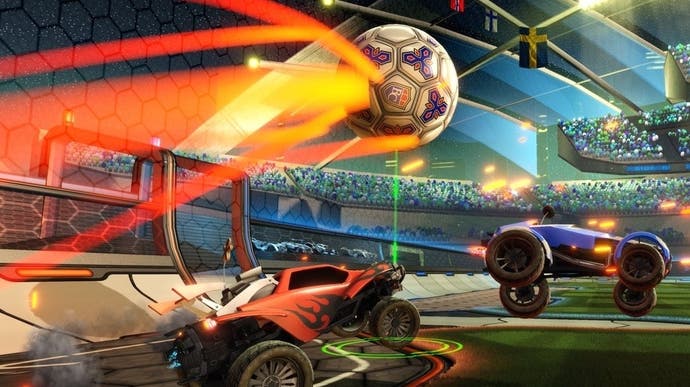Rocket League is ditching its paid, randomised loot boxes later this year
Will adopt model similar to Fortnite Save the World.
Psyonix will be jettisoning paid, randomised loot boxes - or Crates, as it calls them - from its hugely popular four-wheeled football game Rocket League later this year.
Crates, which are tradable, were first introduced to Rocket League in 2016 ("to fund our eSports prize pools and events", claimed Psyonix at the time). They can be acquired by completing online matches, and award a single, random cosmetic item from a set of possible options - including vehicle bodies, decals, rocket boosts, goal explosions, trails, and wheels. However, to open one and claim its contents, players first require a key.
Keys are predominantly a purchasable premium item, although a number have, to date, been included as intermittent tier rewards in Rocket League's paid Rocket Pass. The functionally similar Decryptors (which open crates but prevent item trading) also feature in small quantities as free Rocket Pass rewards, and have appeared during special events.
That will change later this year though, according to a new statement on the Rocket League website. Psyonix says it will soon be removing all paid, randomised Crates from Rocket League and adopting a system similar to that recently implemented by Epic Games (which acquired Psyonix earlier this year) in Fortnite Save the World. The new monetisation scheme will enable players to see "the exact items [they're] buying in advance".
Psyonix notes, however, that there will be no changes to its Rocket Pass Premium, DLC Cars, and Esports Shop, all of which will continue to be available for direct purchase.
While Psyonix insists that both it and Epic have made the decision to phase out Crates as part of a desire to create "the best possible experience for our players", the moves comes at a time when loot boxes are being subjected to increased scrutiny by governments across the globe.
Last year, Belgium and the Netherlands declared loot boxes to be a form of gambling and therefore illegal - a move which has forced publishers to disable the monetisation method in a number of high-profile games, including FIFA, Overwatch, and Counter-Strike: Global Offensive. Then, in May this year, a US Senator proposed legislation to ban loot boxes, pay-to-win mechanics, and other "manipulative design".
And while the UK government has remained steadfast in its assertion that loot boxes aren't gambling, it did at least manage to draw some truly astonishing responses from EA and Epic during a related parliamentary committee earlier this year. Most memorably, EA's vice president of legal and government affairs, Kerry Hopkins, asserted that EA "don't call them loot boxes - we call them surprise mechanics."



.jpg?width=291&height=164&fit=crop&quality=80&format=jpg&auto=webp)




